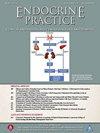Loss of Follow-up for Thyroid Nodules in Patients Living in Poverty
IF 3.7
3区 医学
Q2 ENDOCRINOLOGY & METABOLISM
引用次数: 0
Abstract
Introduction
Inadequate surveillance of thyroid nodules can lead to cancer progression. This study examines patient characteristics that correlate with failure to follow up after thyroid nodule detection.
Methods
We performed a retrospective analysis of patients who underwent fine needle aspiration for thyroid nodules and studied subsequent thyroid ultrasounds, clinic visits, and thyroidectomies longitudinally. Poverty areas are census tracts where at least 20% of residents live below the poverty line. Logistic regression was used to assess associations between patient characteristics and follow-ups, with results expressed as odds ratios (ORs) and 95% CIs.
Results
Of 2446 patients included, the majority were White (62.6%) and female (78.5%), with an average age of 55 ± 16 years. 28% patients were from high poverty areas. Benign findings (Bethesda II) were observed in 73.5% of the biopsies. 42.5% of patients underwent at least one follow-up ultrasound, 59% had at least one clinic visit, and 24.4% underwent a thyroidectomy, with a 34.8% malignancy rate on surgical pathology. Patients from high poverty areas were significantly less likely to receive follow-up ultrasounds (35.7% vs 45.9%, P < .001) or clinic visits (53.7% vs 61.2%, P = .001). Multivariable analysis revealed that poverty was significantly associated with not having follow-up in all patients (OR = 0.78, 95% CI 0.64-0.96) and non-benign biopsy (Bethesda 3 or higher) results (OR = 0.44, 95% CI 0.24-0.81).
Conclusion
There is a notable disparity in the follow-up of thyroid nodules, with patients from high poverty areas being more susceptible to loss of follow-ups.
贫困患者甲状腺结节失去随访。
简介甲状腺结节监测不足可导致癌症进展。本研究探讨了与甲状腺结节检测后未随访相关的患者特征:我们对接受甲状腺结节细针穿刺术(FNA)的患者进行了回顾性分析,并对随后的甲状腺超声检查、就诊和甲状腺切除术进行了纵向研究。贫困地区是指至少有20%的居民生活在贫困线以下的人口普查区。采用逻辑回归评估患者特征与随访之间的关联,结果以几率比(OR)和95%置信区间(CI)表示:在纳入的 2446 名患者中,大多数为白人(62.6%)和女性(78.5%),平均年龄为 55 ± 16 岁。28%的患者来自高度贫困地区。73.5%的活检结果为良性(贝塞斯达 II)。42.5%的患者接受了至少一次超声波随访,59%的患者接受了至少一次门诊随访,24.4%的患者接受了甲状腺切除术,手术病理恶性率为34.8%。来自高度贫困地区的患者接受随访超声检查(35.7% 对 45.9%,P < 0.001)或门诊就诊(53.7% 对 61.2%,P = 0.001)的几率明显较低。多变量分析显示,贫困与所有患者未接受随访(OR = 0.78,95% CI 0.64 - 0.96)和非良性活检(贝塞斯达 3 或更高)结果(OR = 0.44,95% CI 0.24 - 0.81)显著相关:结论:甲状腺结节的随访存在明显差异,来自贫困地区的患者更容易失去随访机会。
本文章由计算机程序翻译,如有差异,请以英文原文为准。
求助全文
约1分钟内获得全文
求助全文
来源期刊

Endocrine Practice
ENDOCRINOLOGY & METABOLISM-
CiteScore
7.60
自引率
2.40%
发文量
546
审稿时长
41 days
期刊介绍:
Endocrine Practice (ISSN: 1530-891X), a peer-reviewed journal published twelve times a year, is the official journal of the American Association of Clinical Endocrinologists (AACE). The primary mission of Endocrine Practice is to enhance the health care of patients with endocrine diseases through continuing education of practicing endocrinologists.
 求助内容:
求助内容: 应助结果提醒方式:
应助结果提醒方式:


